|
|
|
Sort Order |
|
|
|
Items / Page
|
|
|
|
|
|
|
| Srl | Item |
| 1 |
ID:
058818
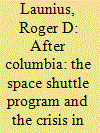

|
|
|
| 2 |
ID:
122532


|
|
|
|
|
| Publication |
2013.
|
| Summary/Abstract |
Between January 1969 and the summer of 1975, NASA received over eight million letters and petition signatures supporting the right of American astronauts to free religious expression in space. Prompted by Madalyn Murray O'Hair's complaints about the reading of Genesis during the flight of Apollo 8, the petition campaign points to the complex ambivalent relationship between religious Americans and their nation's space program. The Genesis reading had provided reassurance that the program, with its secular motivations, its instrumental culture, and its designs upon God's very heavens, was not hostile to faith. But what if NASA now yielded to O'Hair? The petitions flowed in the eschatological anxiety that the sacred space of the skies might be cleared of Christian speech.
|
|
|
|
|
|
|
|
|
|
|
|
|
|
|
|
| 3 |
ID:
142579
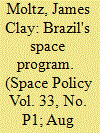

|
|
|
|
|
| Summary/Abstract |
Brazil's space program represents an anomaly among those of the world's 10 largest economic powers. During a time that has witnessed the rapid emergence of a variety of national space programs—even among lesser powers like Iran and South Korea–Brazil's failure to emerge as a significant space actor requires further analysis. This article traces the history of Brazil's space efforts and examines the factors that have held it back, some of which continue to influence its policies today: inadequate funding, conflicting organizations, poorly handled foreign relations, and an unclear national vision for Brazil's “place” in space. Recent efforts to overcome these hurdles through an improved domestic strategy and smarter international relations show promise. But a more sustained political commitment to space development will be needed if they are to succeed.
|
|
|
|
|
|
|
|
|
|
|
|
|
|
|
|
| 4 |
ID:
111259
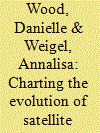

|
|
|
|
|
| Publication |
2012.
|
| Summary/Abstract |
This paper analyzes the historical paths of eight countries - from Africa, Asia and Latin America - as they have pursued technological capability in the area of space technology. The analysis is unfolded in three stages. The first stage introduces a framework called the Space Technology Ladder. This Ladder framework posits a path through four major technology categories, as follows: 1) establishing a national space agency; 2) owning and operating a satellite in low Earth orbit; 3) owning and operating a satellite in geostationary orbit; and 4) launching satellites. The second stage of the analysis uses data to create a graphical timeline, by mapping the historical achievements of the eight countries onto the Ladder framework. The results provide information about the similarities and differences in the technology strategies of the various countries. The third stage is a discussion of the strategic decisions faced by the countries under study. Exploring their diverse strategies is an initial step toward developing prescriptive theory to inform developing country space programs.
|
|
|
|
|
|
|
|
|
|
|
|
|
|
|
|
| 5 |
ID:
169299
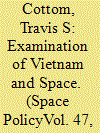

|
|
|
|
|
| Summary/Abstract |
Vietnam is slowly expanding its presence in space and to better understand where Vietnam is going in the future, a thorough examination that incorporates several factors must be completed. This article examines Vietnam's history in space, its space strategy, the organizational structure of its space program, how Vietnam is expanding its presence in space, and how Vietnam plans to use space for national security purposes. The article also reviews Vietnam's cooperation with other space nations where they are substantially benefiting from programs aimed at advancing the capabilities of emerging space nations. The article ends with potential areas that Vietnam and the United States can cooperate to advance both states capabilities in space while at the same time limiting Chinese influence in Vietnam.
|
|
|
|
|
|
|
|
|
|
|
|
|
|
|
|
| 6 |
ID:
110118
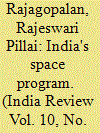

|
|
|
| 7 |
ID:
167910
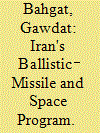

|
|
|
|
|
| Summary/Abstract |
Since the early 1970s, Iran has sought to develop strong missile capabilities. In recent years, Tehran's arsenal has evolved to become the largest and most diverse in the Middle East, though not the most lethal or longest‐range. Israel and Saudi Arabia have also developed formidable capabilities. Iran's program, however, has attracted more political and academic controversies. The Trump administration's decision to withdraw from the 2015 nuclear deal — the Joint Comprehensive Plan of Action (JCPOA) — was partly driven by the fact that it had failed to slow the progress of Iran's missile capabilities. The U.S. withdrawal and occasional European criticism of frequent missile testing have had little, if any, impact on Tehran's determination to advance its capabilities.
|
|
|
|
|
|
|
|
|
|
|
|
|
|
|
|
| 8 |
ID:
100219
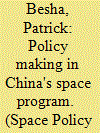

|
|
|
|
|
| Publication |
2010.
|
| Summary/Abstract |
China's space program is one of the most advanced, rapidly improving and opaque in the world. Insight into the program's policy-making process could help eliminate misunderstandings, make intentions more clear and promote stability in US-China relations. This case study of China's first lunar orbiting probe traces the project from initial policy proposal through agenda-setting, policy approval and final policy implementation. It reveals a highly rational decision-making process that is ruled by incrementalism, consensus building, scientific judgment and the use of leading small groups to coordinate among ministries. This research was guided by several relevant theories, including the "fragmented authoritarian" framework of power, the theory of the "policy entrepreneur" and the recently developed "inside access model". The paper is one of the first published accounts in the English language to detail, from policy proposal to policy implementation, China's first mission to the Moon.
|
|
|
|
|
|
|
|
|
|
|
|
|
|
|
|
| 9 |
ID:
101228
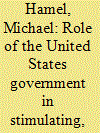

|
|
|
| 10 |
ID:
110596
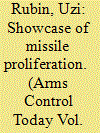

|
|
|
|
|
| Publication |
2012.
|
| Summary/Abstract |
A comprehensive review of missile proliferation published in 1988 listed 20 nonindustrialized nations that were deploying various types of ballistic missiles at the time. Tucked toward the bottom of that list was one Middle Eastern country with just three types of missiles, two of which were actually simple, unguided rockets. That country was Iran.
|
|
|
|
|
|
|
|
|
|
|
|
|
|
|
|
| 11 |
ID:
098141
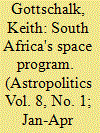

|
|
|
|
|
| Publication |
2010.
|
| Summary/Abstract |
This article analyzes South Africa's space program, which can be divided into three chronological periods. First, was the age of amateurs that took place from 1947-1962. Second, from 1963-1993, South Africa's apartheid regime started various missile projects, including a secret military space launch program aimed at orbiting reconnaissance satellites. Under U.S. Government pressure, this was canceled before the first democratically-elected government came to power in South Africa, and the facilities for manufacturing and static testing the space launch vehicle were destroyed. But, South Africa maintains a nucleus of space heritage infrastructure, including a space launch range with telemetry capabilities, satellite testing, and integration facilities, and aerospace and software industrial sectors. Third, South Africa became a democracy in 1994, and established the legal and institutional infrastructure for a civil space program. Since then, South Africa has started to shape a new space policy, this time with greater public transparency.
|
|
|
|
|
|
|
|
|
|
|
|
|
|
|
|
| 12 |
ID:
142589
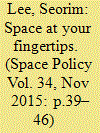

|
|
|
|
|
| Summary/Abstract |
National space programs require the continuous interest and support of the public and government. Surveys and polls are the most commonly used method to monitor the public opinion regarding space activities. Such methods however can only measure the public view of a sample population of people at a specific moment in time. This paper examines the use of internet search trends to monitor and assess the public's changing interest in space activities. By analyzing the varying trends in online demand for information related to space activities, the impact of the government space programs as well as the factors that influence the public's interest are examined. Internet trend data has the potential to become a new metric to assess the relative performance of space policy initiatives, especially in terms of acquiring and managing the interest of the public. The continued interest and support of the public is vital for long term space programs, such as the lunar exploration program, to withstand the changing political environment of multiple administrations.
|
|
|
|
|
|
|
|
|
|
|
|
|
|
|
|
| 13 |
ID:
168227
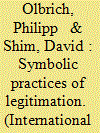

|
|
|
|
|
| Summary/Abstract |
Despite international sanctions and a strained economy, North Korea continues to spend scarce resources on a costly space program. Hitherto, research has usually explained this continuity in terms of international security and/or international reputation. Accordingly, Pyongyang uses its space-related efforts as a pretext to develop intercontinental ballistic missiles and to enhance its international reputation. This article argues that these explanations do not suffice and thus adds domestic motives for consideration. By engaging recent North Korean studies, which emphasize the importance of performance and symbol for the politics of the Kim regime, this article explores recurring actions and routinized behavior by the leadership as symbolic practices that reinforce domestic legitimacy. The goal is to provide a conceptual avenue through which to better understand North Korean affairs. Taking into account the domestic factors also has, as will be shown, practical policy implications for those negotiating with the regime over its space program.
|
|
|
|
|
|
|
|
|
|
|
|
|
|
|
|
| 14 |
ID:
106911


|
|
|
|
|
| Publication |
2011.
|
| Summary/Abstract |
A pressing issue facing the US space program is the projected shortfall in the skilled aerospace workforce, as the number of students in space-related fields wanes. This has prompted many to emphasize the rhetoric of inspiration that prevailed during the Cold War, at the expense of concrete arguments for space that are thought to be lackluster and insufficient. This essay argues that the logic of inspiration fails to consider the changed context and attitudes of this younger public. Instead, such an approach proves counterproductive in attracting generations compelled by a host of ideas, some incompatible with the rhetoric of competition and prestige that prevailed before. Arguments that draw attention to the pragmatic elements of space, and that successfully align space with the notions that make sense now, may in turn prove to be the solution to draw the best and the brightest to the space program.
|
|
|
|
|
|
|
|
|
|
|
|
|
|
|
|
|
|
|
|
|